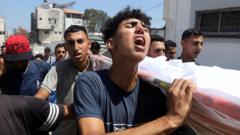A senior Hamas official has revealed to BBC News that efforts to negotiate a ceasefire and a hostage release deal in Gaza have intensified, although talks with Israel remain at an impasse. The comments come following statements from US President Donald Trump, who claimed that "great progress" is being made since the recent conclusion of the Israel-Iran conflict.
Gaza Ceasefire Talks Intensify Amid Continued Violence and Hostage Crisis

Gaza Ceasefire Talks Intensify Amid Continued Violence and Hostage Crisis
Mediators push for ceasefire in Gaza as violence escalates and both sides remain entrenched in their positions.
As hostilities continue, reports indicate that Israeli airstrikes have resulted in significant casualties among Palestinians. The Hamas-run health ministry reported that recent attacks have killed dozens, including victims seeking humanitarian aid. In response to the ongoing violence, Israeli media cited unresolved major disagreements in negotiations. Despite pressures from the U.S., Qatar, and Egypt, previous proposals have failed to materialize into a lasting agreement.
The situation has been further complicated by Israel's blockade on humanitarian aid and its recent partnership with the Gaza Humanitarian Foundation (GHF) aimed at distributing aid, which has faced criticism from various organizations for failing to adhere to humanitarian principles. Amidst this backdrop, opinions in Gaza are divided on the future of the ceasefire, with some viewing it as a possible step towards reducing hostilities and others fearing intensified Israeli operations in the absence of Iranian support for Hamas.
The continued violence has triggered political pressures within Israel, as the country mourns its soldiers lost during combat in Gaza. Calls for an end to the fighting are growing louder, positioning the future of ceasefire negotiations in a precarious state.
The overarching challenges in reaching a viable agreement underscore the complex interplay of regional and international dynamics in the quest for peace in a region long embroiled in conflict.
The situation has been further complicated by Israel's blockade on humanitarian aid and its recent partnership with the Gaza Humanitarian Foundation (GHF) aimed at distributing aid, which has faced criticism from various organizations for failing to adhere to humanitarian principles. Amidst this backdrop, opinions in Gaza are divided on the future of the ceasefire, with some viewing it as a possible step towards reducing hostilities and others fearing intensified Israeli operations in the absence of Iranian support for Hamas.
The continued violence has triggered political pressures within Israel, as the country mourns its soldiers lost during combat in Gaza. Calls for an end to the fighting are growing louder, positioning the future of ceasefire negotiations in a precarious state.
The overarching challenges in reaching a viable agreement underscore the complex interplay of regional and international dynamics in the quest for peace in a region long embroiled in conflict.























